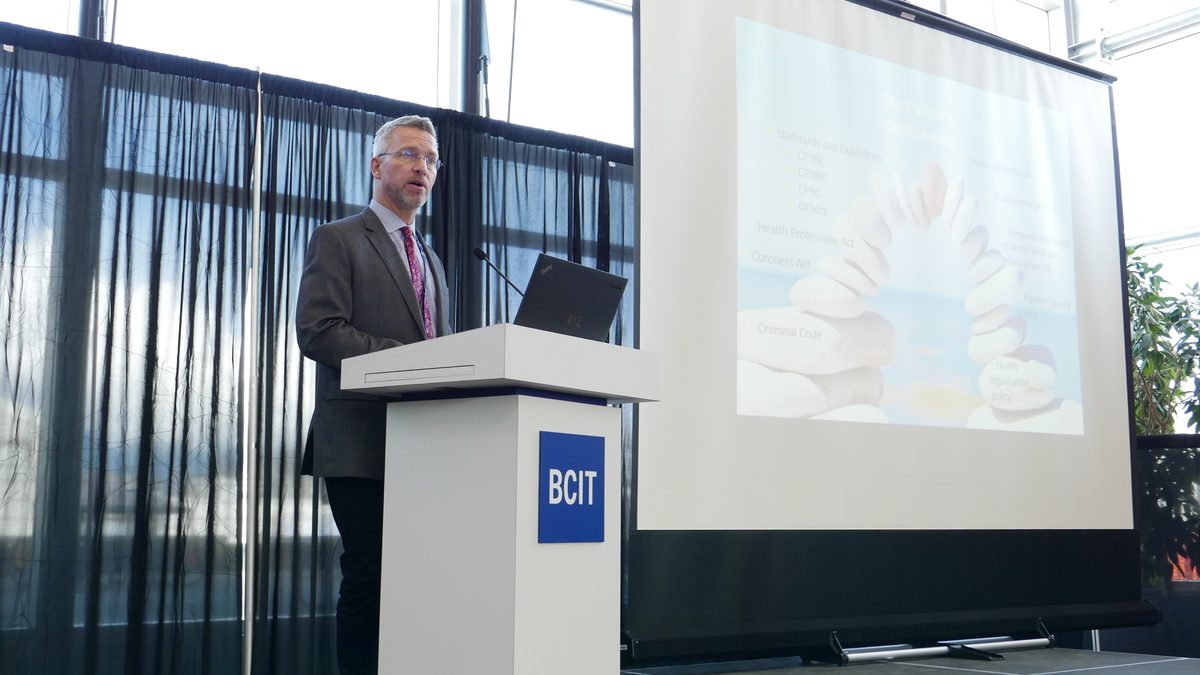The BCIT School of Health Sciences and the BCIT Student Association were pleased to welcome Darren Kopetsky, Regional Director of Client Relations & Risk Management for Vancouver Coastal Health (VCH) to the BCIT Burnaby Campus on February 20th as our second monthly power hour event.
Kopetsky’s presentation on Medical Assistance in Dying was a timely topic as individual health authorities and health care facilities in Canada have now had to deal with implementing necessary policy changes and guidelines stemming from last June’s federal government approval of bill C-14.
Bill C-14 made Medical Assistance in Dying (or MAID) legal in Canada but also put four eligibility criteria in place that patients must meet before qualifying for MAID.
“It is now lawful, in certain circumstances, for a physician (and soon nurse practioner) to administer medication to end a person’s life on his or her informed request,” stated Kopetsky, but “views on MAID are polarized and passionately held.”
Vancouver Coastal Health has written policy that addresses the varying views health care workers hold on Medical Assistance in Dying by affirming anyone’s right to be a conscientious objector. If a health authority employee morally disagrees with MAID, VCH has a process for the employee to not be involved in the provision of MAID. However, all health authority employees are required to “sensitively and objectively address requests about medical assistance in dying,” affirmed Kopetsky.
While some health authorities across Canada might do things differently, VCH has chosen to address a patient’s MAID request where the patient is currently situated. This means that there is no destination that a patient must be transferred to for the provision of MAID. Requests for MAID can be made, assessed, and administered in hospitals, care homes, palliative care facilities, or at a patient’s home, provided the correct qualified professionals are available.
Under the current legislation, only physicians can administer the medication for MAID but other members of the health care team would be involved, including nurses who may be asked to start the IV for MAID administration. Kopetsky points out though, that in order for a nurse to be involved in starting the IV, the nurse must be willing, have IV skills, and have completed additional education on MAID set out by the College of Registered Nurses (CRNBC).
Medical Assistance in Dying is not available to everyone who requests it and there are still many areas of the legislation where wording has yet to be defined or interpreted. The current criteria are:
1. Must have a grievous and irremediable illness
2. Must be 18 years or older
3. Death must be reasonably foreseeable
4. Suffering must be intolerable to the individual
“Many believe this criteria excludes psychiatric illness, as you would need a somatic illness as well in order for death to be reasonably foreseeable,” stated Kopetsky. The current criteria also disallows advanced care planning whereby a person is approved for MAID at a later date when they are no longer cognizant enough to request it. Further government study is ongoing as questions about the legislation’s wording are leading to varied interpretations by health care professionals across Canada.
Legal protection of Medical Assistance in Dying is new to Canada and while each health authority works to implement policy changes to protect and properly care for patients and staff, individual Canadians must also decide how this new legislation fits with their worldview.
